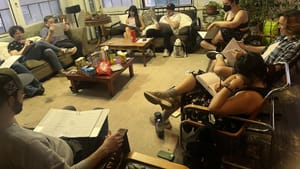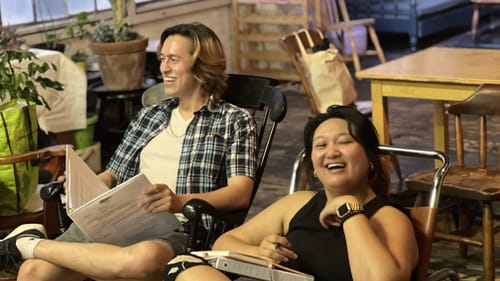Stay in the Loop
BSR publishes on a weekly schedule, with an email newsletter every Wednesday and Thursday morning. There’s no paywall, and subscribing is always free.
Meet Philly’s first dedicated cohort of AAPI playwrights
Philly’s AAPI playwrights are ready for the stage with PWYC readings in May and June

Beyond readings or solo shows, Philly theater companies have never produced a script by a Philly-based Asian American and Pacific Islander (AAPI) playwright. While Philly theaters have embraced AAPI actors and directors, they have yet to support AAPI playwrights at the same level. Despite this, there is a robust Philly community of AAPI playwrights, and you can discover them (if you haven't already) during the Philadelphia Asian Performing Artists’s (PAPA) upcoming reading series (May 12 through June 10, 2024), a great way to celebrate AAPI Heritage Month.
Founded in 2016, PAPA is “a grassroots, membership-based collective that exists to build community among, and address the lack of economic and artistic opportunities for, people of Pan-Asian descent involved in the performing arts in the Philadelphia region.” The spark for PAPA was the Lantern’s 2014 Japanese-“influenced” production of Julius Caesar—which did not, in fact, include any Japanese artists. Makoto Hirano’s subsequent open letter (“How to Stage Your Show without Being Super Racist”) led to meetings and movement-building among AAPI performing artists. With actor and director Bi Jean Ngo taking on the main leadership role, they formed PAPA in the aftermath.
“I didn’t want to keep playing a stereotype”
In advance of this spring’s reading series, I spoke with folks involved in the PAPA Playwrights Project (PAPAPP), including PAPA creative director and lead producer Cat Ramirez, Playwrights Project lead artist Stephanie Kyung Sun Walters, assistant producer Joseph Ahmed, and participants Lexi Thammavong and Amy Boehly.
Walters is a multi-hyphenate theater artist and educator whose play Acetone Wishes and Plexiglass Dreams won the Terrence McNally Award. Her Esther Choi and the Fish that Drowned was slated to be produced by Simpatico but faces ongoing pandemic delay; it would’ve been the first play with multiple characters by a local AAPI artist on a Philly stage.
Walters started her acting career in Philly in 2011 playing traditionally Asian parts, but quickly ran out of roles. “I didn’t want to keep playing a stereotype. I wanted to craft new works that highlight friends and strengths in ways that other people couldn’t see,” she says of why she turned to playwriting. She took classes at PlayPenn and did a residency at its Foundry program, but still found herself thirsting for an AAPI playwriting community. With no such community existing in Philly, and the Ma-Yi Writers Lab limited to New York City residents, Walters asked Ramirez if PAPA could be the home to such a community. Ramirez said yes.
“Initial meetings to develop PAPAPP were just me, Cat, and Bi in my Spruce Street apartment discussing things over popcorn,” Walters says.
Philly’s AAPI playwrights deserve a home-city debut
At its core, PAPAPP is a community where AAPI playwrights can share pages, workshop ideas, and grow as artists. “I was considering quitting the industry because of frustrations with colorism and racism when I first met Cat,” Boehly said. “The best part of PAPA for me, and why I’ve come back to PAPA, is the wonderful community that has been developed by Cat, Steph, and the leaders that came before them.”
Thammavong, a current Foundry member, says that they “had the benefit of various perspectives of age, race, and ability” there. But “within PAPA, it’s been a relief to not have to explain myself about things like family dynamics and culture. Deeper connection and understanding are so necessary and replenishing. There’s also a lot of interesting intersections within PAPA, which help with writing about specific identities.”
Walters helps cultivate professional development opportunities, including meeting AAPI playwrights with a national presence, like Hansol Jung. “I’d love to see plays from the PAPAPP cohort on Philly stages,” Walters says of her hopes for the future. “So often [Philly] playwrights need to submit to other cities to have their debut.”
The current PAPAPP cohort reflects the diversity of the AAPI diaspora across race, generation, and career. The day jobs of its members vary: Boehly is a theater educator and owns a princess impersonator business, Treasure Trove Entertainment; Cinder Kuss is a housing organizer; Arthur Robinson has worked in the admin side of theater, and Claris Park is a lawyer.
New PAPA plays
So how can you get a taste of the work? As the culmination of the current cohort’s work, PAPAPP will hold a play-reading series which is open to the public. The plays offer a wide range of styles and stories, with a few common themes.

Some grapple with memory. In Twins by Seo-A Park, long-lost sisters reconnect. In Flight of the Angels by Dan Kim, a Korean woman is on trial for the murder of her husband, who died by suicide on a religious retreat in the mountains. Several plays feature magical realism or spooky elements. In Nemesis on the Winds by Robinson, two mortals attempt to survive a bloody feast with Gods in the house of Apollo and Artemis. In Ahmed’s Prescribed Burn or Jersey Devil Unicorn, a couple needs a shake-up, so they seek out an online hook-up with someone who just might be the literal Jersey Devil.
Several plays deal with themes around found family. In Boehly’s Plant Mommy Grief Play, a florist acquires a plant store previously owned by her nana, who is living out her final days. Glenn Gardens Gathering by Kuss centers an autistic, nonbinary person’s experience navigating a neurotypical world. In Thammavong’s Joy, a dirty hippie with a sunny disposition interrupts a woman’s plans to die by suicide.
Audiences don’t have to wait
AAPI playwrights are flourishing in Philly, but these artists still face barriers getting their plays produced in a local industry that concentrates power in the hands of mostly white decision-makers.
I didn’t find explicit research about funding for AAPI artists in the Philly theater industry, but the Asian American Performers Action Coalition did research in New York City. Its 2018-2019 Visibility Report found that 92 percent of funding went to primarily white institutions, 100 percent of directors at the largest nonprofits are white, and only 11 percent of writers on Broadway were BIPOC.
When Philly theaters decide to embrace local AAPI playwrights, there is a strong pool of work to choose from. In the meantime, audiences don’t have to wait; they can experience this work by supporting organizations like PAPA and heading to a Playwrights Project reading this spring. The full lineup is below, and all shows are pay-what-you-can ($0-$30).
Nemesis on the Winds. By Arthur Robinson, directed by Caitlin Alvarez. Sunday, May 12, 2024, at 7pm at Theatre Exile, 1340 South 13th Street, Philadelphia.
Plant Mommy Grief Play. By Amy Boehly, directed by Sam Tower. Monday, May 20, 2024, at the Wilma Theater, 265 South Broad Street, Philadelphia.
Glenn Gardens Gathering. By Cinder Kuss, directed by Sunflower B. Rose. Sunday, May 26, 2024, at 7pm at the Louis Bluver Theatre at the Drake, 302 South Hicks Street, Philadelphia.
Prescribed Burn or Jersey Devil Unicorn. By Joseph Ahmed, directed by Cat Rameriz. Sunday, May 26, 2024, at 8pm at the Louis Bluver Theatre at The Drake, 302 South Hicks Street, Philadelphia.
Flight of the Angels. By Dan Kim, directed by Bi Jean Ngo. Sunday, June 2, 2024, at 7pm at Asian Arts Initiative’s Studio D, 1219 Vine Street, Philadelphia.
Twins. By Seo-A Park, directed by Justin Jain. Monday, June 3, 2024, at 7pm at Asian Arts Initiative’s Studio D, 1219 Vine Street, Philadelphia.
Joy. By Lexi Thammavong, directed by Cat Ramirez. Monday, June 10, 2024, at 7pm at Asian Arts Initiative’s Studio D, 1219 Vine Street, Philadelphia.
What, When, Where
Philadelphia Asian Performing Artists Playwright Projects reading series. Pay-what-you-can. May 12 through June 10, 2024, at four Philly venues.
Accessibility
The Wilma is a wheelchair-accessible venue with gender-neutral
restrooms. For more information, visit its website.
Theatre Exile is a wheelchair-accessible
venue with gender-neutral restrooms.
The Drake is a wheelchair-accessible
venue with gender-neutral restrooms.
Asian Arts Initiative is a
wheelchair-accessible venue with gender-neutral and individually isolating
restrooms available.
Sign up for our newsletter
All of the week's new articles, all in one place. Sign up for the free weekly BSR newsletters, and don't miss a conversation.

 Krista Mar
Krista Mar